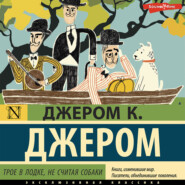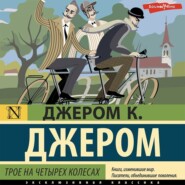По всем вопросам обращайтесь на: info@litportal.ru
(©) 2003-2024.
✖
The Second Thoughts of an Idle Fellow
Настройки чтения
Размер шрифта
Высота строк
Поля
“He took me into another room, and there we met a man named Jansen, to whom he briefly introduced me as a gentleman who ‘desired gloves.’ ‘Yes, sir,’ said Mr. Jansen; and what sort of gloves do you desire?’
“I told him I wanted six pairs altogether – three suede, fawn-coloured, and three cream-coloured – kids.
“He said, ‘Do you mean kid gloves, sir, or gloves for children?’
“He made me angry by that. I told him I was not in the habit of using slang. Nor am I when buying gloves. He said he was sorry. I explained to him about the buttons, so far as I could understand it myself, and about the length. I asked him to see to it that the buttons were sewn on firmly, and that the stitching everywhere was perfect, adding that the last gloves my wife had had of his firm had been most unsatisfactory. Jane had impressed upon me to add that. She said it would make them more careful.
“He listened to me in rapt ecstacy. I might have been music.
“‘And what size, sir?’ he asked.
“I had forgotten that. ‘Oh, sixes,’ I answered, ‘unless they are very stretchy indeed, in which case they had better be five and three-quarter.’
“‘Oh, and the stitching on the cream is to be black,’ I added. That was another thing I had forgotten.
“‘Thank you very much,’ said Mr. Jansen; ‘is there anything else that you require this morning?’
“‘No, thank you,’ I replied, ‘not this morning.’ I was beginning to like the man.
“He took me for quite a walk, and wherever we went everybody left off what they were doing to stare at me. I was getting tired when we reached the glove department. He marched me up to a young man who was sticking pins into himself. He said ‘Gloves,’ and disappeared through a curtain. The young man left off sticking pins into himself, and leant across the counter.
“‘Ladies’ gloves or gentlemen’s gloves?’ he said.
“Well, I was pretty mad by this time, as you can guess. It is funny when you come to think of it afterwards, but the wonder then was that I didn’t punch his head.
“I said, ‘Are you ever busy in this shop? Does there ever come a time when you feel you would like to get your work done, instead of lingering over it and spinning it out for pure love of the thing?’
“He did not appear to understand me. I said, ‘I met a man at your door a quarter of an hour ago, and we talked about these gloves that I want, and I told him all my ideas on the subject. He took me to your Mr. Jansen, and Mr. Jansen and I went over the whole business again. Now Mr. Jansen leaves it with you – you who do not even know whether I want ladies’ or gentlemen’s gloves. Before I go over this story for the third time, I want to know whether you are the man who is going to serve me, or whether you are merely a listener, because personally I am tired of the subject?’
“Well, this was the right man at last, and I got my gloves from him. But what is the explanation – what is the idea? I was in that shop from first to last five-and-thirty minutes. And then a fool took me out the wrong way to show me a special line in sleeping-socks. I told him I was not requiring any. He said he didn’t want me to buy, he only wanted me to see them. No wonder the drapers have had to start luncheon and tea-rooms. They’ll fix up small furnished flats soon, where a woman can live for a week.”
I said it was very trying, shopping. I also said, as he invited me, and as he appeared determined to go on talking, that I would have a brandy-and-soda. We were in the smoke-room by this time.
“There ought to be an association,” he continued, “a kind of clearing-house for the collection and distribution of Christmas presents. One would give them a list of the people from whom to collect presents, and of the people to whom to send. Suppose they collected on my account twenty Christmas presents, value, say, ten pounds, while on the other hand they sent out for me thirty presents at a cost of fifteen pounds. They would debit me with the balance of five pounds, together with a small commission. I should pay it cheerfully, and there would be no further trouble. Perhaps one might even make a profit. The idea might include birthdays and weddings. A firm would do the business thoroughly. They would see that all your friends paid up – I mean sent presents; and they would not forget to send to your most important relative. There is only one member of our family capable of leaving a shilling; and of course if I forget to send to any one it is to him. When I remember him I generally make a muddle of the business. Two years ago I gave him a bath – I don’t mean I washed him – an india-rubber thing, that he could pack in his portmanteau. I thought he would find it useful for travelling. Would you believe it, he took it as a personal affront, and wouldn’t speak to me for a month, the snuffy old idiot.”
“I suppose the children enjoy it,” I said.
“Enjoy what?” he asked.
“Why, Christmas,” I explained.
“I don’t believe they do,” he snapped; “nobody enjoys it. We excite them for three weeks beforehand, telling them what a good time they are going to have, over-feed them for two or three days, take them to something they do not want to see, but which we do, and then bully them for a fortnight to get them back into their normal condition. I was always taken to the Crystal Palace and Madame Tussaud’s when I was a child, I remember. How I did hate that Crystal Palace! Aunt used to superintend. It was always a bitterly cold day, and we always got into the wrong train, and travelled half the day before we got there. We never had any dinner. It never occurs to a woman that anybody can want their meals while away from home. She seems to think that nature is in suspense from the time you leave the house till the time you get back to it. A bun and a glass of milk was her idea of lunch for a school-boy. Half her time was taken up in losing us, and the other half in slapping us when she had found us. The only thing we really enjoyed was the row with the cabman coming home.”
I rose to go.
“Then you won’t join that symposium?” said B – . “It would be an easy enough thing to knock off – ‘Why Christmas should be abolished.’”
“It sounds simple,” I answered. “But how do you propose to abolish it?” The lady editor of an “advanced” American magazine once set the discussion – “Should sex be abolished?” and eleven ladies and gentlemen seriously argued the question.
“Leave it to die of inanition,” said B – ; “the first step is to arouse public opinion. Convince the public that it should be abolished.”
“But why should it be abolished?” I asked.
“Great Scott! man,” he exclaimed; “don’t you want it abolished?”
“I’m not sure that I do,” I replied.
“Not sure,” he retorted; “you call yourself a journalist, and admit there is a subject under Heaven of which you are not sure!”
“It has come over me of late years,” I replied. “It used not to be my failing, as you know.”
He glanced round to make sure we were out of earshot, then sunk his voice to a whisper.
“Between ourselves,” he said, “I’m not so sure of everything myself as I used to be. Why is it?”
“Perhaps we are getting older,” I suggested.
He said – “I started golf last year, and the first time I took the club in my hand I sent the ball a furlong. ‘It seems an easy game,’ I said to the man who was teaching me. ‘Yes, most people find it easy at the beginning,’ he replied dryly. He was an old golfer himself; I thought he was jealous. I stuck well to the game, and for about three weeks I was immensely pleased with myself. Then, gradually, I began to find out the difficulties. I feel I shall never make a good player. Have you ever gone through that experience?”
“Yes,” I replied; “I suppose that is the explanation. The game seems so easy at the beginning.”
I left him to his lunch, and strolled westward, musing on the time when I should have answered that question of his about Christmas, or any other question, off-hand. That good youth time when I knew everything, when life presented no problems, dangled no doubts before me!
In those days, wishful to give the world the benefit of my wisdom, and seeking for a candle-stick wherefrom my brilliancy might be visible and helpful unto men, I arrived before a dingy portal in Chequers Street, St. Luke’s, behind which a conclave of young men, together with a few old enough to have known better, met every Friday evening for the purpose of discussing and arranging the affairs of the universe. “Speaking members” were charged ten-and-sixpence per annum, which must have worked out at an extremely moderate rate per word; and “gentlemen whose subscriptions were more than three months in arrear,” became, by Rule seven, powerless for good or evil. We called ourselves “The Stormy Petrels,” and, under the sympathetic shadow of those wings, I laboured two seasons towards the reformation of the human race; until, indeed, our treasurer, an earnest young man, and a tireless foe of all that was conventional, departed for the East, leaving behind him a balance sheet, showing that the club owed forty-two pounds fifteen and fourpence, and that the subscriptions for the current year, amounting to a little over thirty-eight pounds, had been “carried forward,” but as to where, the report afforded no indication. Whereupon our landlord, a man utterly without ideals, seized our furniture, offering to sell it back to us for fifteen pounds. We pointed out to him that this was an extravagant price, and tendered him five.
The negotiations terminated with ungentlemanly language on his part, and “The Stormy Petrels” scattered, never to be foregathered together again above the troubled waters of humanity. Now-a-days, listening to the feeble plans of modern reformers, I cannot help but smile, remembering what was done in Chequers Street, St. Luke’s, in an age when Mrs. Grundy still gave the law to literature, while yet the British matron was the guide to British art. I am informed that there is abroad the question of abolishing the House of Lords! Why, “The Stormy Petrels” abolished the aristocracy and the Crown in one evening, and then only adjourned for the purpose of appointing a committee to draw up and have ready a Republican Constitution by the following Friday evening. They talk of Empire lounges! We closed the doors of every music-hall in London eighteen years ago by twenty-nine votes to seventeen. They had a patient hearing, and were ably defended; but we found that the tendency of such amusements was anti-progressive, and against the best interests of an intellectually advancing democracy. I met the mover of the condemnatory resolution at the old “Pav” the following evening, and we continued the discussion over a bottle of Bass. He strengthened his argument by persuading me to sit out the whole of the three songs sung by the “Lion Comique”; but I subsequently retorted successfully, by bringing under his notice the dancing of a lady in blue tights and flaxen hair. I forget her name but never shall I cease to remember her exquisite charm and beauty. Ah, me! how charming and how beautiful “artistes” were in those golden days! Whence have they vanished? Ladies in blue tights and flaxen hair dance before my eyes to-day, but move me not, unless it be towards boredom. Where be the tripping witches of twenty years ago, whom to see once was to dream of for a week, to touch whose white hand would have been joy, to kiss whose red lips would have been to foretaste Heaven. I heard only the other day that the son of an old friend of mine had secretly married a lady from the front row of the ballet, and involuntarily I exclaimed, “Poor devil!” There was a time when my first thought would have been, “Lucky beggar! is he worthy of her?” For then the ladies of the ballet were angels. How could one gaze at them – from the shilling pit – and doubt it? They danced to keep a widowed mother in comfort, or to send a younger brother to school. Then they were glorious creatures a young man did well to worship; but now-a-days —
It is an old jest. The eyes of youth see through rose-tinted glasses. The eyes of age are dim behind smoke-clouded spectacles. My flaxen friend, you are not the angel I dreamed you, nor the exceptional sinner some would paint you; but under your feathers, just a woman – a bundle of follies and failings, tied up with some sweetness and strength. You keep a brougham I am sure you cannot afford on your thirty shillings a week. There are ladies I know, in Mayfair, who have paid an extravagant price for theirs. You paint and you dye, I am told: it is even hinted you pad. Don’t we all of us deck ourselves out in virtues that are not our own? When the paint and the powder, my sister, is stripped both from you and from me, we shall know which of us is entitled to look down on the other in scorn.
Forgive me, gentle Reader, for digressing. The lady led me astray. I was speaking of “The Stormy Petrels,” and of the reforms they accomplished, which were many. We abolished, I remember, capital punishment and war; we were excellent young men at heart. Christmas we reformed altogether, along with Bank Holidays, by a majority of twelve. I never recollect any proposal to abolish anything ever being lost when put to the vote. There were few things that we “Stormy Petrels” did not abolish. We attacked Christmas on grounds of expediency, and killed it by ridicule. We exposed the hollow mockery of Christmas sentiment; we abused the indigestible Christmas dinner, the tiresome Christmas party, the silly Christmas pantomime. Our funny member was side-splitting on the subject of Christmas Waits; our social reformer bitter upon Christmas drunkenness; our economist indignant upon Christmas charities. Only one argument of any weight with us was advanced in favour of the festival, and that was our leading cynic’s suggestion that it was worth enduring the miseries of Christmas, to enjoy the soul-satisfying comfort of the after reflection that it was all over, and could not occur again for another year.
But since those days when I was prepared to put this old world of ours to rights upon all matters, I have seen many sights and heard many sounds, and I am not quite so sure as I once was that my particular views are the only possibly correct ones. Christmas seems to me somewhat meaningless; but I have looked through windows in poverty-stricken streets, and have seen dingy parlours gay with many chains of coloured paper. They stretched from corner to corner of the smoke-grimed ceiling, they fell in clumsy festoons from the cheap gasalier, they framed the fly-blown mirror and the tawdry pictures; and I know tired hands and eyes worked many hours to fashion and fix those foolish chains, saying, “It will please him – she will like to see the room look pretty;” and as I have looked at them they have grown, in some mysterious manner, beautiful to me. The gaudy-coloured child and dog irritates me, I confess; but I have watched a grimy, inartistic personage, smoothing it affectionately with toil-stained hand, while eager faces crowded round to admire and wonder at its blatant crudity. It hangs to this day in its cheap frame above the chimney-piece, the one bright spot relieving those damp-stained walls; dull eyes stare and stare again at it, catching a vista, through its flashy tints, of the far-off land of art. Christmas Waits annoy me, and I yearn to throw open the window and fling coal at them – as once from the window of a high flat in Chelsea I did. I doubted their being genuine Waits. I was inclined to the opinion they were young men seeking excuse for making a noise. One of them appeared to know a hymn with a chorus, another played the concertina, while a third accompanied with a step dance. Instinctively I felt no respect for them; they disturbed me in my work, and the desire grew upon me to injure them. It occurred to me it would be good sport if I turned out the light, softly opened the window, and threw coal at them. It would be impossible for them to tell from which window in the block the coal came, and thus subsequent unpleasantness would be avoided. They were a compact little group, and with average luck I was bound to hit one of them.
I adopted the plan. I could not see them very clearly. I aimed rather at the noise; and I had thrown about twenty choice lumps without effect, and was feeling somewhat discouraged, when a yell, followed by language singularly unappropriate to the season, told me that Providence had aided my arm. The music ceased suddenly, and the party dispersed, apparently in high glee – which struck me as curious.
One man I noticed remained behind. He stood under the lamp-post, and shook his fist at the block generally.
“Who threw that lump of coal?” he demanded in stentorian tones.
To my horror, it was the voice of the man at Eighty-eight, an Irish gentleman, a journalist like myself. I saw it all, as the unfortunate hero always exclaims, too late, in the play. He – number Eighty-eight – also disturbed by the noise, had evidently gone out to expostulate with the rioters. Of course my lump of coal had hit him – him the innocent, the peaceful (up till then), the virtuous. That is the justice Fate deals out to us mortals here below. There were ten to fourteen young men in that crowd, each one of whom fully deserved that lump of coal; he, the one guiltless, got it – seemingly, so far as the dim light from the gas lamp enabled me to judge, full in the eye.
As the block remained silent in answer to his demand, he crossed the road and mounted the stairs. On each landing he stopped and shouted —
“Who threw that lump of coal? I want the man who threw that lump of coal. Out you come.”
Now a good man in my place would have waited till number Eighty-eight arrived on his landing, and then, throwing open the door would have said with manly candour —
“I threw that lump of coal. I was – ,” He would not have got further, because at that point, I feel confident, number Eighty – eight would have punched his head. There would have been an unseemly fracas on the staircase, to the annoyance of all the other tenants and later, there would have issued a summons and a cross-summons. Angry passions would have been roused, bitter feeling engendered which might have lasted for years.

















